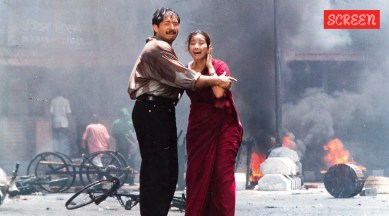Click here to follow Screen Digital on YouTube and stay updated with the latest from the world of cinema.

Cinematographer Rajiv Menon, who shot Mani Ratnam’s Bombay, said that the film would struggle to find a release in theatres today. He said that India has become ‘less tolerant’ in the three decades since Bombay’s release and subsequent emergence as a cult classic. In an interview, he also reflected on some of the supposed visual metaphors in the film, which was set against the backdrop of the 1993 Mumbai blasts and the riots they fuelled.
In an appearance on the O2 India YouTube channel, Rajiv said, “A film like Bombay cannot be made today. The situation in India is so volatile, people take up positions that are so strong, and religion has become such a big issue. I don’t think you can make a film like Bombay, release it in the theatre, and not expect the theatre to be burned down. In these 25-30 years, India has become less tolerant.”
Asked if Manisha Koirala’s character shedding her burqa during the “Tu Hi Re” song was a metaphor for her leaving behind her faith, Rajiv clarified, “We didn’t have props on that set, we just had the fort wall. The location was shown to me by one of my father’s friends, who was a commodore in the Navy. Long after my father died, I insisted on having the anchor as a prop, and her outfit got stuck in it and got caught. It was just this idea that we had about not getting stuck with the same costume. There was this beautiful blue dress, and it would’ve been boring to have just one dress. We didn’t have a dance master or anything.”
Director Mani Ratnam shed some light on his decision to use the most haunting melody that AR Rahman had composed for the scenes involving violence. He said, “For all the violent scenes, we had the score. It’s agony. It is not the drums, it is not the violins that are being underlined, but it is the pain behind the violence.” Rajiv added, “The city was burning. Anybody else would’ve picked (a thrilling score), but what he picked was the emotion of the mother searching for her child. It was essentially a lullaby.”
In a past interview, also with O2 India, Rajiv had recalled Rahman being influenced by faith. The composer was born a Hindu, but converted to Islam some years into his career. Rajiv said, “There was a period they didn’t know Hindi, so I would be the translator. I have seen this period of transition and gravitation towards religion, and belief. I have seen Rahman deal with immense pressure from within the family, especially with the marriages of his sisters. It was music that helped him brave the storm.”
Click here to follow Screen Digital on YouTube and stay updated with the latest from the world of cinema.